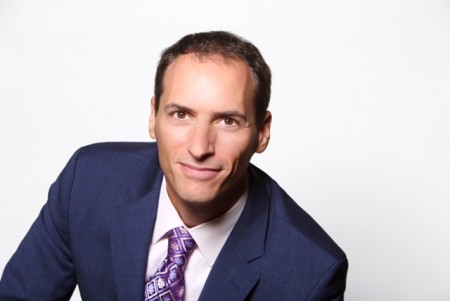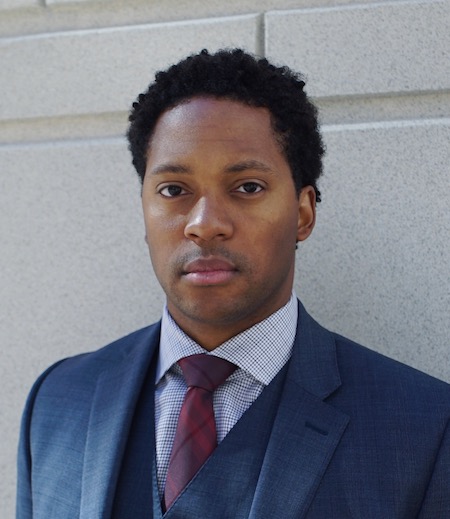A conversation about food insecurity, pursuing charitable endeavors in the legal industry

Ari Kaplan. Photo by Lauren Hillary.
Ari Kaplan recently spoke with Tyrone Thomas, a vice president and deputy general counsel at Invenergy and the founder of Conversation for Six, a nonprofit organization focused on expanding ongoing discussions about food insecurity.
Ari Kaplan: Tell us about your background and the genesis of Conversation for Six.
Tyrone Thomas: I grew up in West Philadelphia and was raised by a single mother in a household that I would say was teetering just on the right side of the line of food security. My two sisters and I never went hungry, but I know my mother definitely skipped meals herself to make sure that we always had enough. In that community, however, there were many people who were properly food insecure, had significant issues with making sure they had enough money for the fundamentals, and that rippled into the rest of their lives in ways that are fairly obvious. So hunger has always been something close to me. Growing up, I saw the charity of neighbors in the community, including churches and other organizations, providing meals for those who could not afford three meals a day. That stuck with me. Fast-forward, I graduated from Hunter College in New York City and the University of Illinois College of Law, where I met my wife. I was in private practice and worked for three different firms in three different cities before moving in-house to Invenergy, which is a global leader in sustainable energy solutions. There are myriad benefits associated with working in-house, but you lose some of the infrastructure of a law firm, such as pro bono. Instead, I continually seek out boards to support, among other ways to give back, and continue the work I was doing in private practice. My wife and I work with different food banks and meal programs, donate to every can drive that comes up, and donate money to a variety of organizations focused on hunger work here and abroad. Most recently, I joined the board of directors of Beyond Hunger, which is my local food bank. When speaking with others about the hunger crisis, there always seems to be too much background needed to become conversant. For example, many of the press releases from organizations doing amazing work are often littered with the alphabet soup of government agencies and government programs. I felt that if we could lower the barrier to entry for some people to become fluent in this space, we could encourage them to join us in fighting hunger. That’s really where the idea for Conversation for Six was born.
Ari Kaplan: How do you balance your community focused work and your legal practice?
 Tyrone Thomas, a vice president and deputy general counsel at Invenergy.
Tyrone Thomas, a vice president and deputy general counsel at Invenergy.
Tyrone Thomas: My work with Conversation for Six is something that I structured from Day One to be incredibly efficient and automated to the extent that it can be. We have a handful of freelance writers and a contract editor. In the beginning, I spent nights and weekends establishing the structure and setting the tone for what we are publishing. I choose the topics and offer guidance on the content generally. Our writers then select the topics on which they want to write. When I volunteer with outside organizations, I engage in a similar conversation about the amount of time I can dedicate and how efficiently I can help the organization. Working as a member of a board of directors is a little easier because everyone is typically a busy professional giving consistency to the cadence of the meetings and any required follow-up.
Ari Kaplan: How does Conversation for Six differ from the other organizations in which you are involved, such as Beyond Hunger?
Tyrone Thomas: We’re not providing direct services to anyone. There are many organizations doing amazing work supporting people who need help and providing a vehicle for individuals who want to help to support them, either financially or with their time and advocacy. We are trying to direct people who need those services and inform those who could support them. We are, in essence, evangelizing the existing anti-hunger infrastructure.
Ari Kaplan: How do you shape the content that you share to achieve your goals?
Tyrone Thomas: I read a lot about hunger and related issues. In doing so, there are always elements that require explanation and I ask: “Would this be something of interest for someone who’s trying to learn more about this space?” I periodically share my list of topics and questions with our writers, who decide where to focus and how to convey the information.
Ari Kaplan: How has the pandemic affected the hunger crisis?
Tyrone Thomas: It has exacerbated it in a few ways. First, it has increased the number of people who are food insecure. We have significant unemployment right now. We have a number of business owners, especially in the food industry, who are really unable to operate. As a result, many people are losing their livelihoods and are now unable to afford food. We also have people upstream in that supply chain, in the agricultural sector, who also aren’t able to operate properly. Compounding the problem is that those farmers, as well as restaurants, used to donate excess produce and other items. Their generosity helped organizations with restaurants to support food banks, meal programs and food pantries, but as the entire supply chain continues to be disrupted, these efforts are no longer possible. Second, it has strained the anti-hunger infrastructure, which has made it harder to help people. Grocery stores and restaurants are giving these programs less than they used to because of their own struggles. Another important part of this issue is that a lot of organizations trying to help the food insecure in their community are fully staffed by volunteers, many of whom are older or retired. Those in the highest risk categories have had to stay home, forcing many food pantries to shut down due to a lack of individuals to run them. Food insecurity was already high in many communities, and now the resources that were serving those communities are unavailable because of the health risks associated with the coronavirus. It’s been increasingly difficult for this industry because the virus has caused problems on multiple fronts.
Ari Kaplan: How can the legal community positively impact food insecurity?
Tyrone Thomas: People can volunteer and donate, but I think they can also provide back office support for some of these organizations on a pro bono basis. Many have simple questions and no one to ask. Law firms that offer pro bono clinics for startups are providing immeasurable value for those who do not know where to begin. You can start by partnering with an individual organization or a regional entity. For example, the Greater Chicago Food Depository supports about 700 member organizations, including Beyond Hunger. It can pinpoint different areas of need, and legal professionals may be surprised at how simple some of their issues are.
Ari Kaplan: What type of change are you ultimately hoping to create with Conversation for Six?
Tyrone Thomas: First, I want to direct support to those who might need some help and haven’t taken advantage of what is available due to shame or pride since they are only familiar with a soup kitchen, a meal program or food stamps. I want that person to know that there are a variety of other options, such as no-questions-asked pantries, churches and other organizations. There are also subsidized farmers markets, extensions of the School Breakfast Program, the National School Lunch Program and the Summer Food Service Program that can help remove the cost of a child’s meals from a household budget. There are a variety of ways that people can get help if they need it, and the site is designed to educate and serve as a resource to direct people towards that help. Second, I want to connect with the person who wants to help and doesn’t know enough to decide whether to volunteer or donate. Volunteering takes on many forms and could include providing free legal advice, operational guidance, business counseling and, of course, advocacy.
Ari Kaplan: Do you see lawyers creating more charitable initiatives as a result of the pandemic?
Tyrone Thomas: I hope with every fiber of my being that it will be the case. We are all reading the same news and the question is: “What do you do when you see that story and when you see the aggregate of those stories?” I always love reading about a law firm partner who saw an injustice and fought for good. I always love those stories because they reflect what I’m doing, which is reading, absorbing and recognizing that there is something that I can do.
Listen to the complete interview at Reinventing Professionals.
Ari Kaplan regularly interviews leaders in the legal industry and in the broader professional services community to share perspective, highlight transformative change and introduce new technology at his blog and on iTunes.



